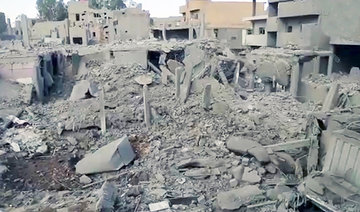BAB Al-HAWA, Syria: Fatima Rashid was recovering in a Syrian hospital after a deadly suicide blast when she glanced at a teenager with a bloody, disfigured face. She did not recognize her daughter.
The wounded teenager was later taken across the border to Turkey for treatment and now Rashid, like many parents caught up in a horrifying attack on Saturday, is searching frantically for her child.
“I lifted the curtain back in the emergency room and I saw a girl. Half her face was gone and she was bleeding,” Rashid told AFP, speaking at a shelter for displaced families near the Syria-Turkey border.
“I didn’t think about whose daughter she was.”
“When I woke up the next day, the doctors came to show me a picture of that girl. I remembered what my daughter Ghadir had been wearing. That was her,” she said, with tears in her eyes.
At least 68 children were among 126 people killed when a suicide car bomb tore through buses evacuating Foua and Kfraya, two villages in northern Syria under opposition siege.
Dozens of wounded, including 37-year-old Fatima and her children, were rushed to hospitals in nearby opposition-controlled territory, while others were taken to regime-held Aleppo city.
Fatima has no news of Ghadir, her son Adel, 15, her 13-month-old daughter Rimas, or her husband Mohannad.
Only Zahra, 7, is safely at Fatima’s side.
The carnage on Saturday came as thousands gathered to be evacuated from Foua and Kfraya as part of a complex deal that also saw people leave Madaya and Zabadani, towns near Damascus surrounded by pro-regime forces.
“I saw a car distributing potato chips to the children. My daughter asked me to get her a bag, but a little kid came and snatched the bag from me,” Fatima said.
A smile briefly crossed her face before it turned dark again, as she remembered the devastating scene that followed.
“I went to get another one and suddenly something exploded. I flew back onto the ground and there were bodies on top of me.... I pulled myself and my daughter out from under the bodies and ran.”
“They took us to a hospital and treated us well... But when they took Ghadir to Turkey, I didn’t know anything. They didn’t even have her name,” Fatima said.
Dozens of survivors from were squatting on blankets and rugs in the displacement center, awaiting news of relatives of whom they lost track after the explosion.
Several children, some as young as three, sat shell-shocked in a row, staying quiet as people asked for their names or where their parents were.
One woman, whose daughter was taken to another village for treatment, anxiously tried to locate her in unfamiliar opposition-controlled territory.
“Where is this village? How am I supposed to know anything about her?” she called out.
Nearby, Umm Mohammad, her face scratched and her left hand wrapped in gauze, was hysterical.
She was flanked by her two young boys, whose faces were bandaged, but her third child was nowhere in sight.
“I want information about my son. Is he in Turkey? Did he die?” she screamed, as mothers nearby tried to soothe her.
“He’s eight months old, he can’t tell people who he is. No one knows his name. How am I supposed to get to him?”
In a section of the tent reserved for men, Shareef Al-Hussein, 35, waited with his two sons.
Haydar, 10, was lightly wounded in the forehead. All that was visible of four-year-old Hamza’s face from behind his bloodied bandages was his nose.
“My children cry every day because they want to see their mother. We hope to go back one day” to Kfraya, Hussein said.
He and fellow evacuees were besieged for two years by opposition fighters — some of whom helped rescue people hurt in the suicide attack.
“They got us medication and food, they helped us with the kids,” Hussein told AFP, which requested that opposition fighters not be present during the interview.
Osama, a resident of Foua who had joined a local pro-regime militia in the village, said he was “not afraid” of being in opposition-controlled territory.
“Our brothers here are assuring us that we are not their hostages,” he said.
Syria’s six-year war has so bitterly divided its population that many anti-regime fighters and residents of regime-held territory struggled to believe they were under the same tent.
Abu Obeida, a 33-year-old opposition fighter, said he helped rescue wounded civilians after Saturday’s attack, but acknowledged it was “difficult” to say how he would have reacted if a deal between the two sides had not been underway.
“But I had to rescue the children and the old people,” he added.
“It’s a human issue.”



























